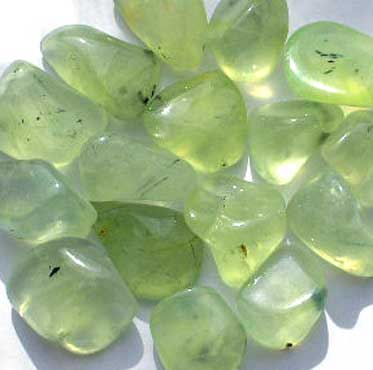Founder: Gabriela Yasmin Szafman
Prehnite will Work:
• Prehnite is quite a protective stone.
• It can protect one on all levels, as it strengthens the life force and generally increases energy as well as stimulating it.
• It aids spirit communication through meditation and visualization, out of body travel and as a powerful dream stone.
• It is also known as a stone of prophesy which stimulates inner knowing of oneself.
• It is a very accepting stone, encouraging analytical thinking and helps to dispel unpleasant memories.
• Prehnite crystals will help to teach one to let go of old memories that are painful.
• If there has been avoidance of the truth due to pain, these crystals will assist you in facing, understanding, and ridding yourself of that pain.
• It will help one to recognize the true potent ional that lies within, your divine self.
• It will guide in fulfilling this potential, even if it is through a mundane life.
• It eases acceptance of circumstance without allowing the surrender of dreams.
A Dutch colonel, H. Von Prehn, is credited with discovering Prehnite in 1774 at the Cape of Good Hope in Africa.
Early traders nicknamed the gemstone Cape Emerald in hopes of exploiting its green color.
Prehnite was originally classified as a Zeolite, due to the fact that it usually forms in the same areas and under similar conditions as the zeolite.
Prehnite is a fairly strong crystal, quite resistant to pressures and scratching. It is composed of aluminum, calcium and silicon with a few specimens containing small trace of iron as well.
It is considered a secondary or second stage mineral, meaning that the crystal did not form during the initial volcanic activity, but instead the crystals were form by events caused by the volcano, much after the fact.
Initially Prehnite was rare, South Africa being the only known location for many, many years.
Eventually pockets of the stone were found throughout the world, including the US, Canada, Austria, Germany, France and India.
Prehnite is found in basaltic volcanic rocks, in intrusive igneous rocks, and in some metamorphic rocks as well.
The pale green masses have been found in Scotland, dark green or greenish brown in Australia, and aggregates of crystals in France.




